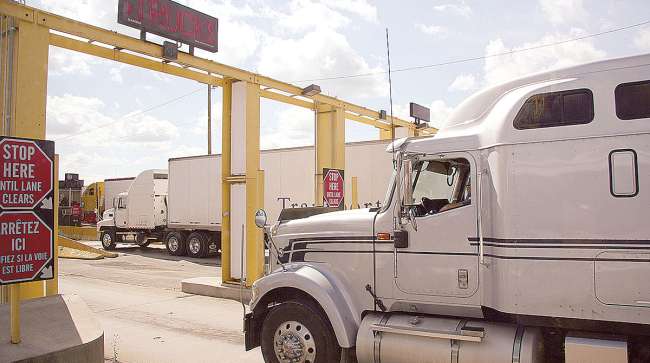Senior Reporter
Canada Hikes Price of Diesel Fuel With New Carbon Tax

The Canadian government has begun implementation of a federal carbon tax program that will extend the increase in the cost of diesel fuel for all truckers, including those from the United States, doing business in all 10 Canadian provinces.
The program, which took effect April 1, is designed to help achieve Canada’s Paris Agreement climate goal of reducing carbon pollution by 30% below 2005 levels by 2030.
The 2018 Greenhouse Gas Pollution Pricing Act implements the federal carbon pollution pricing system for fuels and will be administered by the Canada Revenue Agency.

Kedzie
The new federal tax scheme applies to the provinces of Saskatchewan, Manitoba, Ontario and New Brunswick beginning April 1 and will apply to Nunavut and Yukon territories beginning July 1, according to an information document compiled by Glen Kedzie, energy and environmental affairs counsel for American Trucking Associations.
Since the provinces of British Columbia, Alberta and Quebec have been implementing carbon pricing systems for several years, they already meet the minimum federal standards and the new law does not apply to them. Other provinces and territories including the Northwest Territories, Nova Scotia, Prince Edward Island, Newfoundland and Labrador, have planned or proposed carbon pricing systems that will meet the latest federal requirements, the ATA summary document said.
In provincial jurisdictions without a carbon charge currently in place, the price of diesel in Canadian currency will add 5.37 cents per liter in 2019, rising to 13.41 cents by 2022, according to the Canadian Trucking Alliance.
Truckers traveling into Canada from the United States now are required to register in one of the four new provinces if they have not registered in one of the provinces already charging a carbon tax. They also will be subject to paying the higher cost of diesel purchased in Canada.
CTA said that with about 270,000 large combination trucks in Canada, the Canadian trucking industry could contribute $945 million in 2019 carbon charge payments and close to $3.2 billion by 2022. (The average fuel efficiency of a Class 8 truck reporting to Natural Resource Canada’s Smartway program is 38.4 liters per 100 kilometers. This figure is based on a Class 8 longhaul tractor traveling 230,000 km a year.)
@CanTruck Chair Calls for Reinvestment of Carbon Charge & Supply Chain Education https://t.co/3Qd84zK391 pic.twitter.com/J1anfu1zrs — CTA (@CanTruck) March 22, 2019
“The trucking industry is dominated by small businesses and competes on very tight margins, with operating ratios in the 0.94 range,” CTA Chairman Scott Smith said. “With these operating ratios, the ability to absorb rising costs is a challenge.”
“With close to three-quarters of a billion dollars being taken out of the longhaul trucking sector as a result of the carbon tax over the 2019-22 period, it is time for members of the supply chain to understand the potential impact of these costs,” Ontario Trucking Association Chairman David Carruth said.
To help offset these rising cost challenges associated with the carbon charge, CTA said it continues to call on the federal government to introduce a heavy-truck green technology incentive program similar in structure to the Écocamionnage program in Quebec. That program features incentives for such technology as anti-idling, aerodynamics for tractors and trailers, driver monitoring and telematics, and hybrid-electric propulsion systems, CTA said.
“It is important for government to keep in mind, as noted in the Phase I and II heavy-truck carbon regulations, that the diesel engine remains the most viable option for the longhaul trucking industry,” Smith said. “Combined with the fact that fleets need to stay competitive in the marketplace by managing their fuel consumption irrespective of a carbon charge and making additional capital investments in carbon-regulated equipment, these facts leave many CTA members questioning the policy rationale of a carbon charge on diesel, especially if the revenues contributed by industry do not flow back.”




